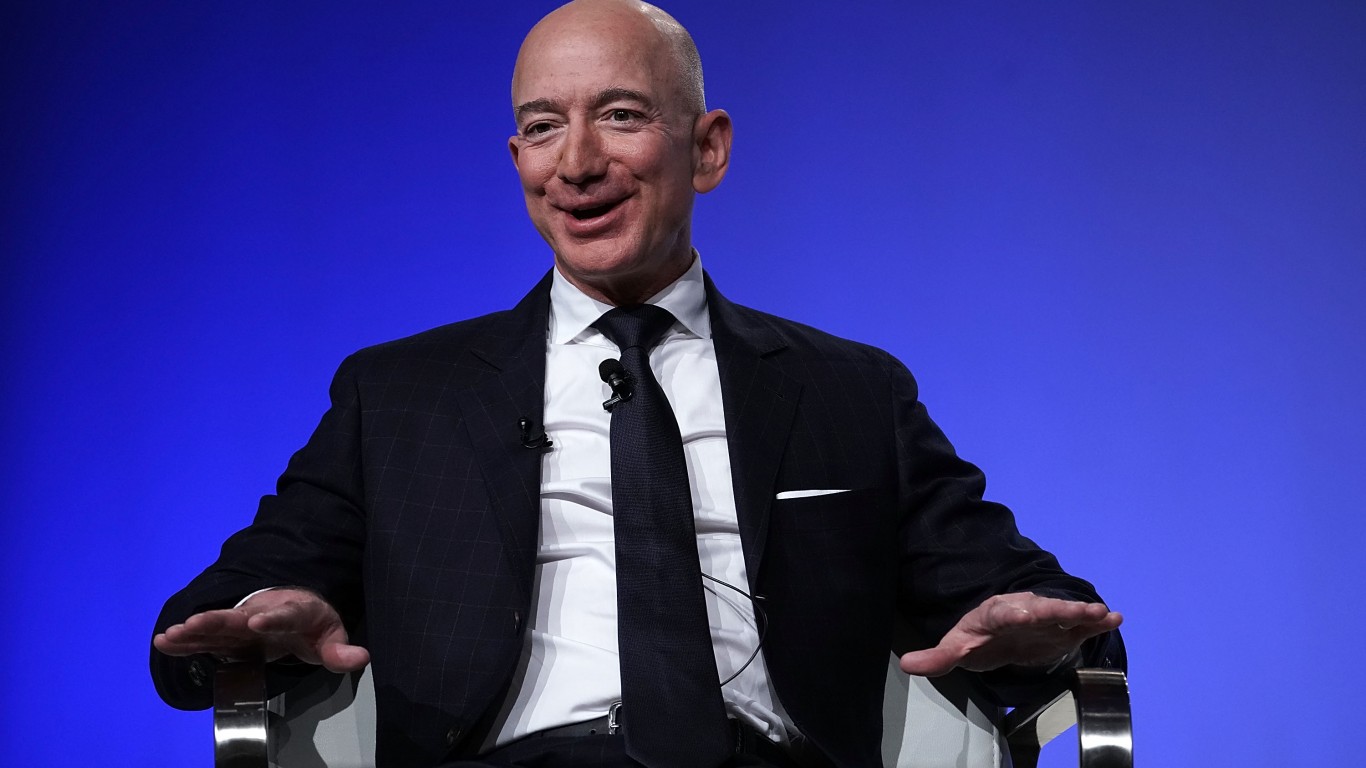
He’s the owner of a trillion-dollar company and he’s been to space. You don’t need three guesses to know we’re talking about the legendary Jeff Bezos. Under Bezos, Amazon has disrupted the entire retail industry and is poised to do so in areas like groceries and pharmaceuticals as well. Seeing not just mom-and-pop stores but major retail chains go out of business in large part because of Amazon may give us some pause. But you gotta admit you love seeing that Amazon van stop in front of your house, dropping off those smiley-face packages. It’s like every day is your birthday and you got just what you wanted.
We’ve gushed enough about the materialistic cornucopia that is Amazon. Bezos himself doesn’t just know how to build a world-changing business, but he has some ideas about living a meaningful life, no matter what your profession or income bracket. For folks in their 60s who are taking stock of their lives and planning their way to new accomplishments, Bezos has some ideas that are worth considering.
1. Investing in True Ideas

When you have something that you know is true, even over the long term, you can afford to put a lot of energy into it.
This original quote from Bezos had to do with understanding long-term truths about Amazon’s customers, such as the fact that they would always want fast delivery. This, then, is where the company poured its effort.
What truths do you know about yourself and the world that you can invest yourself into? What will you always want, regardless of where you live or what you do? This might include financial goals, like living within your means, investing regularly in your retirement account, or being your own boss. It could also mean you will want a good work/life balance, time spent on your hobbies, and consistent effort in your relationships. These long-term things that will always be true about you and your desires will provide structure and focus to your future planning.
2. Stubborn, But Flexible

If you’re not stubborn, you’ll give up on experiments too soon. And if you’re not flexible, you’ll pound your head against the wall and you won’t see a different solution to a problem you’re trying to solve.
Amazon is stubborn about offering value to their customers in a wide array of products delivered conveniently to their door. But they are flexible in how that is accomplished. For example, Amazon offers many of its own products but also allows other companies and ordinary people to sell on their platform as well. Delivery is available via dedicated Amazon trucks as well as private vehicles, or customers can pick up their own packages in storage lockers at dedicated centers. The company has even done some research into the possibility of delivering by drone.
By the time we reach our 60s we know what we like and what we don’t and our worldview is largely settled. There’s a danger, though, that we will be stubborn in beliefs and behaviors that hold us back and flexible in area we should hold firm on. Adjusting to new technology and social customs can be a mark of our continued youthful outlook. Insisting on doing heavy physical labor that is becoming beyond our ability is an area where we can be flexible and ask for help so that we can keep reaching for higher priority goals.
3. Keeping the Right Focus

If we can keep our competitors focused on us while we stay focused on the customer, ultimately we’ll turn out all right.
Competition—and criticism—have been fierce for Amazon. Rather than responding in kind, Bezos has led the company to continue putting the customer at the center of focus. This is one of the reasons the company has been able to innovate while its competitors react to Amazon’s latest move and are always a few steps behind.
For those who are still working in their 60s, it can feel like we’re rapidly being surpassed by younger people and maybe rushed out the door toward retirement when we still have a lot to offer. We can find more peace, though, by focusing on doing our own work to the highest quality and ignoring the office drama. Let the others fight over recognition and promotions and other tinsel prizes the company dangles in front of its drones to get them working harder. You’ve reached a stage of your career where you’ve already proven yourself and can just let your work speak for itself.
4. Politeness . . . Even Online

E-mail has some magical ability to turn off the politeness gene in a human being.
Jeff Bezos’ comment about e-mail of course applies to any sort of social media these days. Sitting alone in front of our screens, lost in our own thoughts where we are the star, we feel like we can say whatever we want online. It might all seem harmless but multiplied across millions of people and billions of online interactions, this negativity infects society and starts to manifest in the ways people act out in real life.
Even though we can act like a “Karen” anonymously online, the most important person in your life watches your behavior and learns something about you. And that person is YOU. When you permit yourself to put out hostility into the world, you teach yourself that this is the kind of person you are. And so, that is the kind of person you become, in real life.
5. Reputation

A brand for a company is like a reputation for a person. You earn reputation by trying to do hard things well.
In your 60s, are you still trying to do hard things? Many times we do plenty of hard things in our youth out of necessity. Maybe you worked construction to help put yourself through college. You took demanding, low-paying jobs just to build your resume. You moved to another state or country, you reinvented yourself after a job loss or divorce.
Don’t think that as you near retirement, the hard things are all over. They just change. It was hard raising children, but lonely now that they’re grown. Physical work that made your muscles ache might be replaced with illness or disability at this stage of life. But look back at all those hard things you’ve already done. You have a reputation now as someone who faces and overcomes hard things. And you’re still that person, well able to handle whatever lies ahead for you. Live up to, and exceed, the reputation you’ve already built.
6. Growth Mode

We can’t be in survival mode. We have to be in growth mode.
Bezos has led Amazon always to think about how to grow in terms of the products it offers its customers, ways to advertise those products to them, and ways to deliver them. This has definitely left the company’s competitors in survival mode, though!
Would you say that right now in your life you’re more in survival mode or growth mode? This doesn’t have to do with how busy you are or how much (or little) money you have to meet your obligations. What is the state of your mind, no matter what your challenges are? You could be living hand-to-mouth, you might have a disability, or you could have four part-time jobs now to cover the mortgage. But is your attitude one of “I’m barely keeping my head above water right now. I can’t do anymore.” Or is it “This is challenging but I am keeping my head above water. And I’m going to look around and find solutions.” That’s what living in growth mode looks like.
7. Glorifying the Past

The death knell for any enterprise is to glorify the past — no matter how good it was.
A predictable feature of growing older is that we start remembering what life was like when we were younger and compare it (usually in an unrealistic photoshopped way) to the life of young people today. Notice that Bezos says this attitude is a death knell for any enterprise. And that includes the enterprise that is your life. A person who can’t stop thinking and talking about the past shows they don’t think they have any future. So don’t go around ringing your own death knell by obsessing over the good old days.
What’s the alternative? Well, what does a child do when you give them one push on a swing? They don’t just sit there and think about how great that was. They say again!” So too, take your good memories and be inspired to build new ones. Not exactly the same and not always with the same people, but find things that enrich your life that you can remember with fondness later. And so, use the past as inspiration to teach us what to avoid and what to seek out. And then use what you’ve learned from the past to help you move forward.
8. Minimize Regrets

I wanted to project myself forward to age 80 and say, ‘OK, I’m looking back on my life. I want to minimize the number of regrets I have.’
All of us have regrets. Jeff Bezos’ faults went on display in a very public infidelity scandal that led to his divorce in 2019, with a $38 billion settlement that made his ex-wife the third richest woman in the United States. Although the publicity and financial magnitude of the couple’s situation made it unique, at its basic level it is something millions of other couples have also been through. And if not this particular issue, then all of us have something we deeply regret—often many things.
Living a life without making mistakes, without hurting people or being hurt by them, is not possible and it’s not the answer. We could only achieve such a thing by living in total isolation, and that, in itself would be a cause for great regret because it isn’t really living at all. So notice Bezo says he wants to minimize the number of regrets he will have later in life. His goal is not to add needlessly to the mistakes he has to live down. And, consider too that minimizing regrets also means making amends to those we have hurt, forgiving others who have hurt us, and perhaps most difficult: forgiving ourselves.
9. Opportunity

If you decide that you’re going to do only the things you know are going to work, you’re going to leave a lot of opportunity on the table.
In business and in life, we have to take risks if we want rewards. It’s true of buying a used car, starting a business, committing to a relationship, and reinventing yourself as you reach your best years in retirement age. You’ve taken plenty of those risks in life, but by now, you know what works for you and might feel comfortable with it even if it’s not the best. Like someone who always orders their favorite dish at their favorite restaurant, this can give you reliable comfort, but means you might miss out on the new restaurant on the other side of town you would like even better if you tried it. In what areas of your life could you spice things up, and potentially reap great rewards, by taking a risk on something new?
10. Your Time Horizon

If everything you do needs to work on a three-year time horizon, then you’re competing against a lot of people. But if you’re willing to invest on a seven-year time horizon, you’re now competing against a fraction of those people… Just by lengthening the time horizon, you can engage in endeavors that you could never otherwise pursue.
Bezos led Amazon to think on longer timeframes than many of its competitors did. This meant they invested in some technologies and corporate acquisitions that didn’t pay off for them right away, but over the decades became an integral part of the company’s profitability.
As you move through your 60s, don’t assume that you don’t have much time left, even if you hear of people passing away at your age or younger. Did you know there are nearly 3 million Americans alive today who are in their 90s? If you become one of them, do you want to have lived 1/3 of your life just biding your time? Make plans. And not just short-term plans. Where would you like to see yourself 5 years from now? 10? 20? 30? What do you need to do today to pivot in your career, your health and fitness, and your social and spiritual life to love your life at those milestones? And what part of that can you do today?
It’s Your Money, Your Future—Own It (sponsor)
Retirement can be daunting, but it doesn’t need to be.
Imagine having an expert in your corner to help you with your financial goals. Someone to help you determine if you’re ahead, behind, or right on track. With SmartAsset, that’s not just a dream—it’s reality. This free tool connects you with pre-screened financial advisors who work in your best interests. It’s quick, it’s easy, so take the leap today and start planning smarter!
Don’t waste another minute; get started right here and help your retirement dreams become a retirement reality.
Thank you for reading! Have some feedback for us?
Contact the 24/7 Wall St. editorial team.




